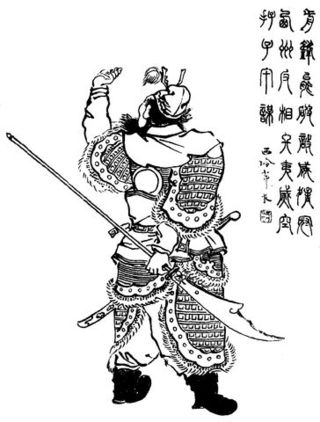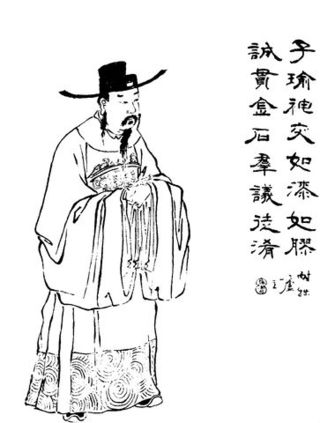
Zhang He, courtesy name Junyi, was a military general serving under the warlord Cao Cao in the late Eastern Han dynasty of China. He continued serving in the state of Cao Wei under its first two rulers, Cao Pi and Cao Rui, during the Three Kingdoms period until his death.

Sima Yi, courtesy name Zhongda, was a Chinese military general, politician, and regent of the state of Cao Wei during the Three Kingdoms period of China.

Wei Yan, courtesy name Wenchang, was a Chinese military general and politician of the state of Shu Han during the Three Kingdoms period of China. Originally a subordinate of the warlord Liu Bei in the late Eastern Han dynasty, Wei Yan rose through the ranks and became a general when Liu Bei seized control of Yi Province in 214. His performance in battle helped him to become a prominent figure in the Shu military in a short period of time. He was later appointed as the Administrator of Hanzhong Commandery and as an Area Commander in 219. Between 228 and 234, he participated actively in the Northern Expeditions led by the Shu regent Zhuge Liang against Shu's rival state, Cao Wei. After Zhuge Liang's death in c.September 234, Wei Yan was killed by another Shu general, Ma Dai, for alleged treason.

Zhuge Jin, courtesy name Ziyu, was a Chinese military general and politician of the state of Eastern Wu during the Three Kingdoms period of China. Born in the late Eastern Han dynasty, Zhuge Jin started his career in the 200s as an official under the warlord Sun Quan, who later became the founding emperor of Eastern Wu in the Three Kingdoms period. In 215, he served as Sun Quan's representative in a territorial dispute over southern Jing Province between Sun Quan and his ally, Liu Bei. In 219, he joined Sun Quan's general Lü Meng in an invasion of Liu Bei's territories in Jing Province after Sun Quan broke the Sun–Liu alliance. He was subsequently appointed as a general and commandery administrator. Before the Battle of Xiaoting of 221–222, Zhuge Jin attempted to dissuade Liu Bei from going to war with Sun Quan but was unsuccessful. The battle ultimately concluded with victory for Sun Quan's side; both sides made peace later and reestablished an alliance between the Eastern Wu and Shu Han states against their rival state, Cao Wei. From 222 until his death in 241, despite being rather incompetent in military affairs, Zhuge Jin served as one of Eastern Wu's top generals and participated in some battles against Cao Wei forces.

Chen Shou, courtesy name Chengzuo (承祚), was a Chinese historian, politician, and writer who lived during the Three Kingdoms period and Jin dynasty of China. Chen Shou is most known for his most celebrated work, the Records of the Three Kingdoms (Sanguozhi), which records the history of the late Eastern Han dynasty and the Three Kingdoms period. Chen Shou wrote the Sanguozhi primarily in the form of biographies of notable persons of those eras. Today, Chen's Records of the Three Kingdoms is part of the Twenty-Four Histories canon of ancient Chinese history.

Zhuge Liang's Northern Expeditions were a series of five military campaigns launched by the state of Shu Han against the rival state of Cao Wei from 228 to 234 during the Three Kingdoms period in China. All five expeditions were led by Zhuge Liang, the Imperial Chancellor and regent of Shu. Although they proved unsuccessful and ended up as a stalemate, the expeditions have become some of the best known conflicts of the Three Kingdoms period and one of the few battles during it where each side fought against each other with hundreds of thousands of troops, as opposed to other battles where one side had a huge numerical advantage.

Cao Zhen, courtesy name Zidan, was a military general of the state of Cao Wei during the Three Kingdoms period of China. He was an adopted son of Cao Cao, a warlord who rose to power in the late Eastern Han dynasty and laid the foundation for Wei. After Cao Cao's death and the end of the Eastern Han dynasty, Cao Zhen served under Cao Pi and Cao Rui, the first two emperors of Wei. He is best known for leading a successful defence of Wei from the first two of a series of invasions by Wei's rival state, Shu Han, between 228 and 229.

Meng Da, courtesy name Zidu, was a military general of the state of Cao Wei during the early Three Kingdoms period of China. He previously served the warlords Liu Zhang and Liu Bei during the late Eastern Han dynasty before defecting to Wei. In Wei, he served under the first two rulers, Cao Pi and Cao Rui. Around late 227, he started a rebellion in Wei and aimed to rejoin the Shu-Han but the revolt was swiftly suppressed by the Wei general Sima Yi. Meng Da was captured and executed for treason.

Zhuge Dan, courtesy name Gongxiu, was a Chinese military general and politician of the state of Cao Wei during the Three Kingdoms period of China. When he held key military appointments throughout his middle to late career, he was involved in all of the three rebellions which broke out in Shouchun between 251 and 258. During the second rebellion, he actively assisted the Wei regent Sima Shi in suppressing the revolt. After the rebellion, the Wei government put him in charge of Shouchun. As the Sima clan became more powerful and established themselves as the de facto rulers of Wei, Zhuge Dan feared that he would end up slain like Wang Ling and Guanqiu Jian – the leaders of the first two rebellions – so he started the third rebellion against Sima Zhao, who succeeded Sima Shi as regent of Wei in 255. Although he received some support from Wei's rival state Eastern Wu, his rebellion was eventually suppressed by Wei imperial forces and he met his end at the hands of Hu Fen, a military officer under Sima Zhao.
Guo Huai, courtesy name Boji, was a military general of the state of Cao Wei during the Three Kingdoms period of China. He started his career towards the end of the Eastern Han dynasty under the warlord Cao Cao as a subordinate of Cao Cao's generals Xiahou Yuan and Zhang He. During the Three Kingdoms period, he served in Wei, the state established by Cao Cao's son Cao Pi, and lived through the reigns of four Wei emperors. From the 220s until his death in 255, he governed and defended Wei's western borders in Yong and Liang provinces. During this time, he resisted multiple invasions by Wei's rival state, Shu Han, and quelled some rebellions by local Qiang, Di and other non-Han Chinese tribes.
Huang Quan, courtesy name Gongheng, was a military general of the state of Cao Wei during the Three Kingdoms period of China. He previously served under the warlords Liu Zhang and Liu Bei during the late Eastern Han dynasty and in the state of Shu Han during the early Three Kingdoms period before defecting to Cao Wei. Liu Bei relied heavily on Huang Quan for counsel in both domestic and foreign policy. Under the Wei government, however, Huang Quan was restricted to only internal affairs because even though the Wei emperor Cao Pi appreciated him for his talent, he doubted Huang Quan's allegiance and believed he was still secretly loyal to Liu Bei.
Hao Zhao, courtesy name Bodao, was a military general of the state of Cao Wei during the Three Kingdoms period of China. He is best known for his victory at the siege of Chencang in 229 when he led a successful defence of Chencang against an invasion by a much larger army from Wei's rival state Shu Han. However, he died of illness not long after that.

The Empty Fort Strategy is the 32nd of the Chinese Thirty-Six Stratagems. The strategy involves using reverse psychology to deceive the enemy into thinking that an empty location is full of traps and ambushes, and therefore induce the enemy to retreat. Some examples are listed in the following sections.
Fei Shi, courtesy name Gongju, was an official of the state of Shu Han during the Three Kingdoms period of China.

The Battle of Wuzhang Plains was fought between the contending states of Cao Wei and Shu Han in 234 AD during the Three Kingdoms period of China. The battle was the fifth and last of a series of Northern Expeditions led by Shu's chancellor, Zhuge Liang, to attack Wei. Zhuge Liang fell ill and died during the stalemate and subsequently the Shu forces retreated.

The Conquest of Shu by Wei was a military campaign launched by the dynastic state of Cao Wei against its rival Shu Han in late 263 during the Three Kingdoms period of China. The campaign culminated in the fall of Shu Han and the tripartite equilibrium maintained in China for over 40 years since the end of the Eastern Han dynasty in 220. The conquest laid the foundation for an eventual reunified China under the Western Jin dynasty in 280.

The Battle of Mount Qi was a military conflict which took place around Mount Qi between the states of Cao Wei and Shu Han in 231 during the Three Kingdoms period of China. It was also the most vigorous of the five Shu invasions of Wei, resulting in thousands of deaths on both sides. Although Zhuge Liang was able to make significant achievement in the beginning of the battle, the battle finally concluded with a strategic Wei victory due to the insufficient food supply for the Shu Han army. The insufficient food supply was caused by heavy rain and mistakes made by Li Yan. The Shu regent, Zhuge Liang, spent three years recuperating before launching another invasion on Wei in 234.
Sima Yi (179–251) was a general, politician and regent of the state of Cao Wei (220–266) in the Three Kingdoms period (220–280) in China. Two of his sons, Sima Shi (208–255) and Sima Zhao (211–265), rose to power in the 250s and consecutively served as regents throughout the reigns of the last three Wei emperors. After Sima Zhao died in September 265, his son Sima Yan (236–290) forced the last Wei ruler, Cao Huan (246–303), to abdicate the throne in his favour in February 266, ending the Wei regime and establishing the Jin dynasty (266–420). This article contains the family trees of Sima Yi, his brothers, and their descendants up to Sima Yan's generation. For more details on the family trees of the Jin emperors, see Chinese emperors family tree (early)#Jin Dynasty and Chu.
The Eastern Wu campaign against Cao Wei was a military offensive launched in 241 by the state of Eastern Wu against its rival state, Cao Wei, during the Three Kingdoms period of China. The campaign was initiated by Wu's founding emperor, Sun Quan, two years after the death of the second Wei emperor, Cao Rui. The campaign ended with an overall failure.
Zhou Tai was a military general who served in the state of Cao Wei during the Three Kingdoms period of China.













